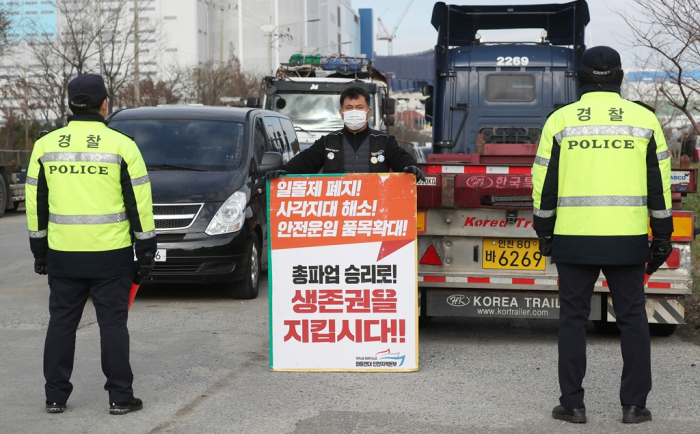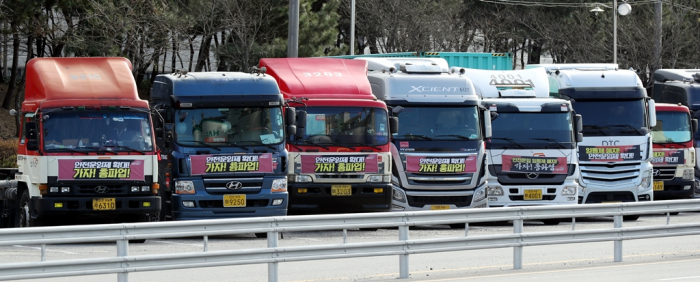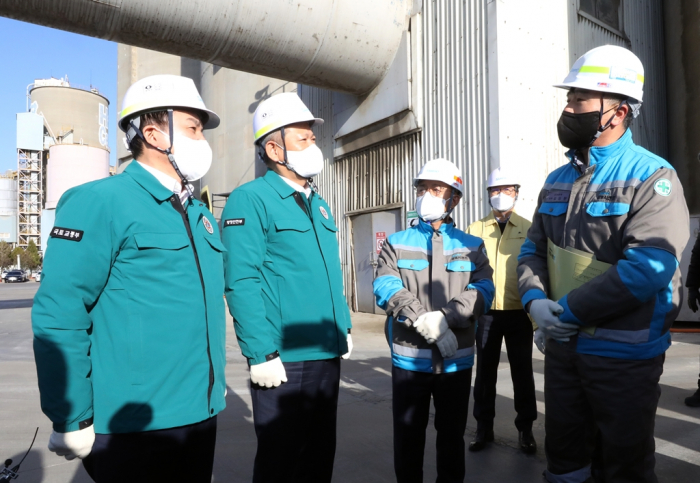Supply chain
KoreaŌĆÖs industrial losses balloon to $1.2 bn as truckers continue strike
The truck drivers' work stoppage is disrupting industrial activity in Asia's fourth-largest economy, which faces a slump
By Dec 01, 2022 (Gmt+09:00)
2
Min read
Most Read
Alibaba eyes 1st investment in Korean e-commerce platform


Blackstone signs over $1 bn deal with MBK for 1st exit in Korea


OCI to invest up to $1.5 bn in MalaysiaŌĆÖs polysilicon plant


Korea's Lotte Insurance put on market for around $1.5 bn


NPS loses $1.2 bn in local stocks in Q1 on weak battery shares



South KoreaŌĆÖs manufacturing sector faces ballooning losses across industries as the trucker strike entered its eighth day on Thursday, disrupting the countryŌĆÖs supply chain and exports amid stalled talks between unionized workers and the government over minimum wage rules.
The countryŌĆÖs four major industries ŌĆō auto, steel, oil refining and cement ŌĆō saw a combined loss of 1.6 trillion won ($1.23 billion) over the past week due to the strike, according to the trade and industry ministry.
The four sectors have seen 1.6 trillion won in lost shipments and unfulfilled deliveries since the strike began on Nov. 24, the ministry said in a statement.
The loss included 562,600 tons of steel worth 731.3 billion won, 6,707 vehicles worth 319.2 billion won, 259,238 kiloliters of oil products valued at 442.6 billion won and 97.6 billion won worth of cement products, it said.
The cement industry, originally feared to come to a complete production halt, is now expected to see improved conditions as some of the striking truckers are returning to work, the ministry said.

Members of the 25,000-strong Cargo Truckers Solidarity began a nationwide walkout last week, disrupting industrial activity in Asia's fourth-largest economy, which is set to slump next year.
The union has been demanding the legislation of the Safe Trucking Freight Rates System designed to prevent dangerous driving and guarantee minimum freight rates for truck drivers to cope with rising fuel prices.
However, the government said it would maintain the minimum pay system only for three years.
As concerns rise over a shortage of fuel, pricier groceries and a widening negative impact on other parts of the export-dependent economy, the government unprecedently invoked a law forcing 2,500 cement industry drivers back to work earlier this week.
On Thursday, the trade ministry said it is also considering issuing an order for oil industry truck drivers to return to work.
If the workers refuse to comply with the government order, they could face up to three years in prison or a fine of up to 30 million won a person.

TRADE ASSOCIATIONS MAY SUE TRUCKERS
Major trade associations such as the Korea International Trade Association┬Ā(KITA), the Korea Petrochemical Industry Association, the Korea Iron & Steel Organization and the Korea Automobile Manufacturers Association, on behalf of their member companies, are considering filing complaints against the truck drivers, according to the trade ministry.
ŌĆ£The current situation is serious. If prolonged, the strike would spread to the entire industries, affecting the peopleŌĆÖs lives,ŌĆØ Jang Young-jin, first vice minister of trade, industry and energy, said at a government meeting on Thursday.
The strike comes in less than six months as an earlier agreement between the government and the truckers failed to address the issue of whether to turn their deal into law.
In mid-June, the unionized truck drivers ended their eight-day work stoppage after reaching an agreement, with a promise from the government to continue talks to expand the scope of minimum wage guarantees for various types of cargo carriers.
Industry watchers said the agreement at the time could be a stop-gap measure as the pay guarantee system requires a law revision.
Write to So-Hyeon Kim at alpha@hankyung.com
In-Soo Nam edited this article.
More to Read
-
 EconomyKorea exports dip for 2nd month, growth slows to 1-year low
EconomyKorea exports dip for 2nd month, growth slows to 1-year lowDec 01, 2022 (Gmt+09:00)
3 Min read -
 Central bankBOK takes 25-bp rate hike as won rebounds against dollar
Central bankBOK takes 25-bp rate hike as won rebounds against dollarNov 24, 2022 (Gmt+09:00)
2 Min read -
 Supply chainKorean truck drivers end strike as govt agrees to extend wage guarantee
Supply chainKorean truck drivers end strike as govt agrees to extend wage guaranteeJun 15, 2022 (Gmt+09:00)
1 Min read -
 Supply chainChemical makers to halt plants as truck driver strike deepens
Supply chainChemical makers to halt plants as truck driver strike deepensJun 14, 2022 (Gmt+09:00)
3 Min read -
 Supply chainIndustrial losses balloon as Korean trucker strike enters 7th day
Supply chainIndustrial losses balloon as Korean trucker strike enters 7th dayJun 13, 2022 (Gmt+09:00)
3 Min read
Comment 0
LOG IN


